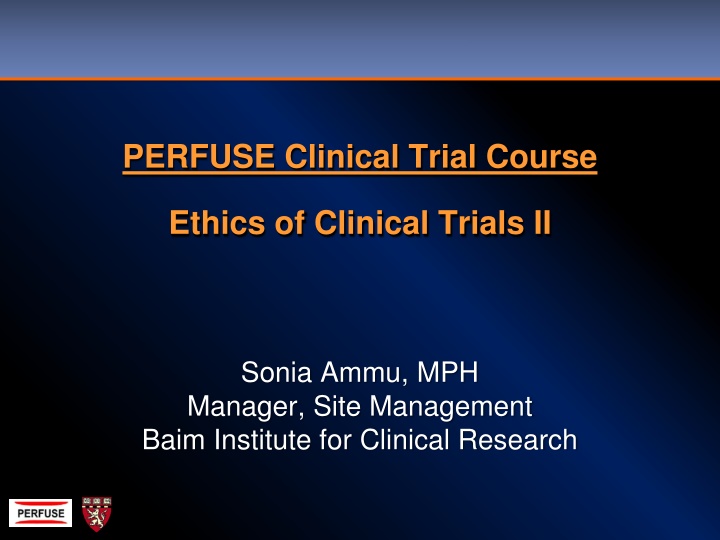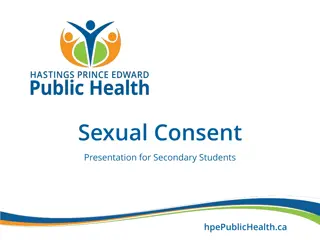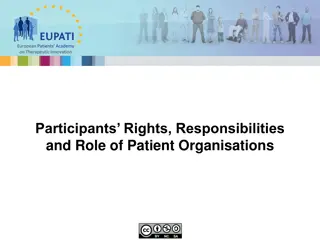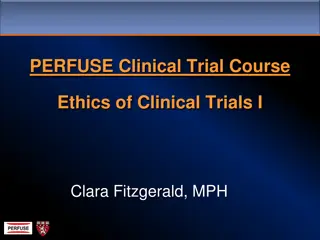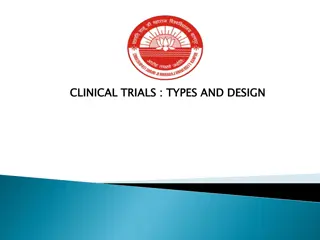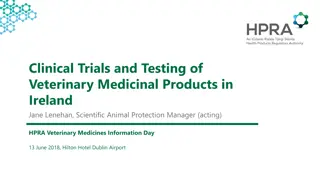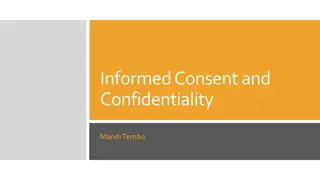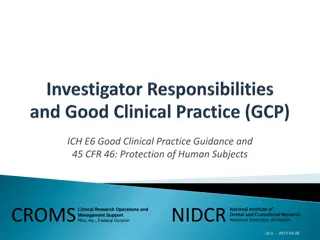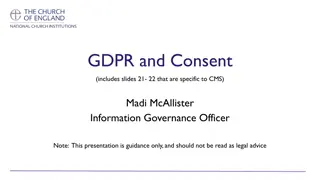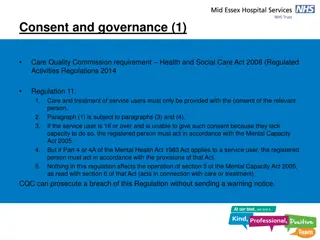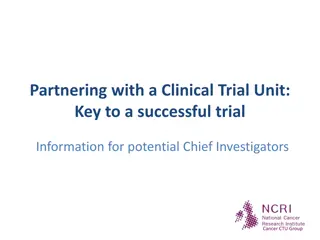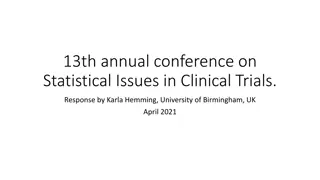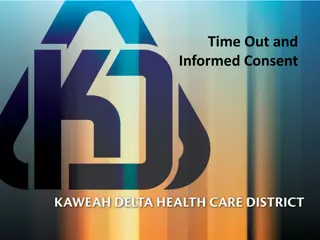Ethical Aspects of Informed Consent in Clinical Trials
Understanding the ethical foundation of informed consent in clinical trials is crucial for ensuring participant protection, autonomy, and decision-making. Key historical milestones and guidelines have shaped the requirements for obtaining informed consent, emphasizing the importance of voluntary participation, comprehension of information, and safeguarding participant rights and well-being.
Download Presentation

Please find below an Image/Link to download the presentation.
The content on the website is provided AS IS for your information and personal use only. It may not be sold, licensed, or shared on other websites without obtaining consent from the author.If you encounter any issues during the download, it is possible that the publisher has removed the file from their server.
You are allowed to download the files provided on this website for personal or commercial use, subject to the condition that they are used lawfully. All files are the property of their respective owners.
The content on the website is provided AS IS for your information and personal use only. It may not be sold, licensed, or shared on other websites without obtaining consent from the author.
E N D
Presentation Transcript
PERFUSE Clinical Trial Course Ethics of Clinical Trials II Sonia Ammu, MPH Manager, Site Management Baim Institute for Clinical Research
Agenda Ethics of Clinical Trials Part 1 Historical Context Rules of Science Important Ethical Guidelines Responsible Conduct of Research & the 7 Principles Ethics of Clinical Trials Part 2 Informed consent Equipoise
Ethical Basis of Informed Consent 1947, Nuremberg Code: Voluntary consent is essential. 1964, Declaration of Helsinki: Consent should be obtained if at all possible and increased vigilance is needed for vulnerable subjects. 1979, Belmont Report, Respect for persons tenet: Informed consent is necessary part of showing respect for all persons. 1981, FDA harmonized 21 CFR 50 with OHRP 45 CFR 56, Subpart A. Outline requirements for obtaining informed consent 1991, The Common Rule, 45 CFR 46: Baseline standard of ethics by which any government-funded research in the US is held. Revised common rule implemented on January 21, 2019. 199I, International Conference for Harmonisation Good Clinical Practice [GCP E6 (R2)]: Freely given informed consent should be obtained from every subject prior to clinical trial participation.
Why is Informed Consent Necessary? Ethical requirement (respect for persons) Ensures the subject is fully and accurately informed Ensures subject demonstrates comprehension of the information Authenticates decision to participate is voluntary Protect the rights, safety and well-being of subjects
Respect for Persons Requires that subjects enter into the research voluntarily and with adequate information Consists of two separate moral requirements: the requirement to acknowledge autonomy and the requirement to protect those with diminished autonomy Subjects, to the degree that they are capable, must be given the opportunity to choose what shall or shall not happen to them. This opportunity is provided when adequate standards for informed consent are satisfied.
Essential Elements of Informed Consent Purpose and description of research/ study Voluntary participation Length of participation Alternatives to participation Description of all procedures, including which procedures are research vs. SOC Risks Confidentiality Contact Information
When Should Informed Consent Process Be Conducted? Before starting any study-specific procedures, including wash-out periods Use the informed consent process as an opportunity to reiterate information and ensure the subject continues to be fully informed and is voluntarily participating Re-consenting should occur if new information is learned that could affect the subject s willingness to continue participation or changes to the protocol occur for the subject
Conducting the Informed Consent Process Introduce yourself to establish a relationship with the subject Explain the consent procedures and process to the subject, closely following the IRB approved process Discuss the Informed Consent Form with potential subject Allow adequate time to read the ICF and consider participation and all options Allow appropriate amount of time for the subject to ask questions and have them answered in a satisfactory manner Ensure subject is fully informedby assessing comprehension
Informed Consent Must Occur Without Coercion or Undue Influence Coercion: The practice of persuading someone to do something by using force or threats Undue influence: occurs through an offer of an excessive or inappropriate reward or other overture in order to obtain compliance
Procedures Following Obtaining Consent Original ICF should maintained with research documents unless approval by IRB to maintain in different manner Give a copy of the signed ICF to subject Document that informed consent process was performed Document and place a copy of the signed ICF in the subject s medical record Document continued desire to participate at each subsequent study visit Re-consent if needed; informed consent is an ongoing process
Common Audit Findings Associated with the Informed Consent Process Correction does not follow the SLIDE rule (single line, initialed by person making correction, date, explanation of correction if needed) or the use of white out Investigator signature outside of 72-hour window (if this is a requirement) ICP documentation not found Person obtaining consent not qualified (not on Delegation Of Authority Log or IRB application)
Aims of Clinical Research vs. Clinical Care Clinical research and clinical care have different aims Clinical research: to produce and advance medical knowledge Clinical care: to secure the best health interests of the patient Aims appear to be in conflict: aims of clinical research appear inconsistent with best health interests of the patient
Origin of Apparent Conflict Conflict arises as RCT enrollment to advance clinical research appears to be inconsistent with patient s best health interest, due to presumed inferiority of unproven experimental arm In a 1:1 randomized control trial, half of the subjects will get an unproven therapy, which is not in their best health interest However, improvements in current treatments depend on advances in clinical research
Equipoise Equipoise exists between two treatments when there is a state of genuine uncertainty in the expert medical community regarding their comparative merits If an investigator is in a state of equipoise between the two treatment arms, they do not violate their role as a physician since they do not knowingly offer the inferior treatment to the patient
Applying Equipoise to Clinical Trials RCT is permissible when: There is equipoise regarding the two arms at the beginning of the trial The trial is designed to yield results to reasonably disrupt equipoise
References and Further Reading Grady C. Enduring and emerging challenges of informed consent. N Engl J Med. 2015 Feb 26;372(9):855-62. Grady C, Cummings SR, Rowbotham MC, McConnell MV, Ashley EA, Kang G. Informed Consent. N Engl J Med. 2017 Mar 2;376(9):856-867. Freedman B. Equipoise and the ethics of clinical research. N Engl J Med. 1987;317(3):141-145. Joffe S, Cook EF, Cleary PD, Clark JW, Weeks JC. Quality of informed consent in cancer clinical trials: a cross-sectional survey. Lancet. 2001 Nov 24;358(9295):1772-7. Miller GF, Joffe S. Equipoise and the randomized clinical trial dilemma. N Engl J Med. 2011;364:476-480. Weijer C, Miller PB. When are research risks reasonable in relation to anticipated benefits. Nat Med. 2004;10(6): 570-573.
